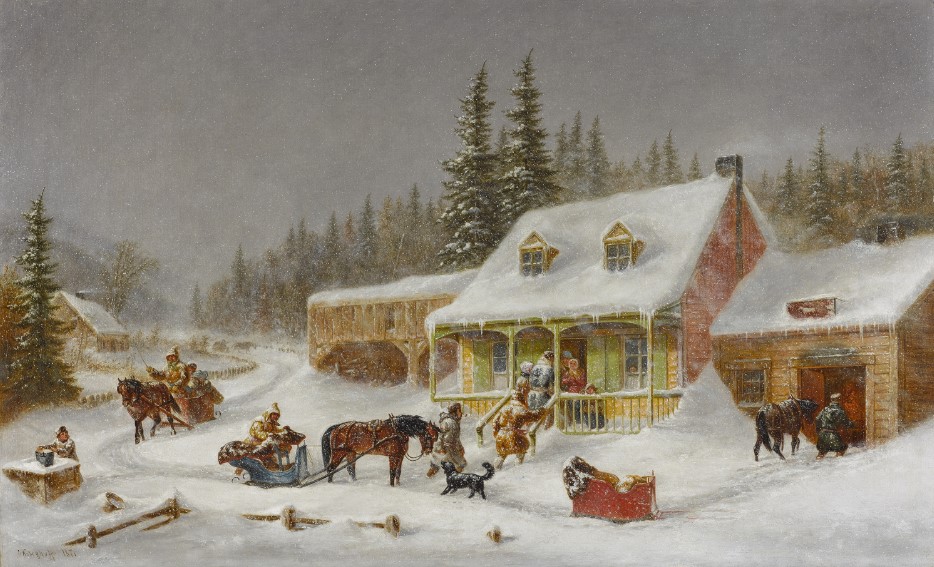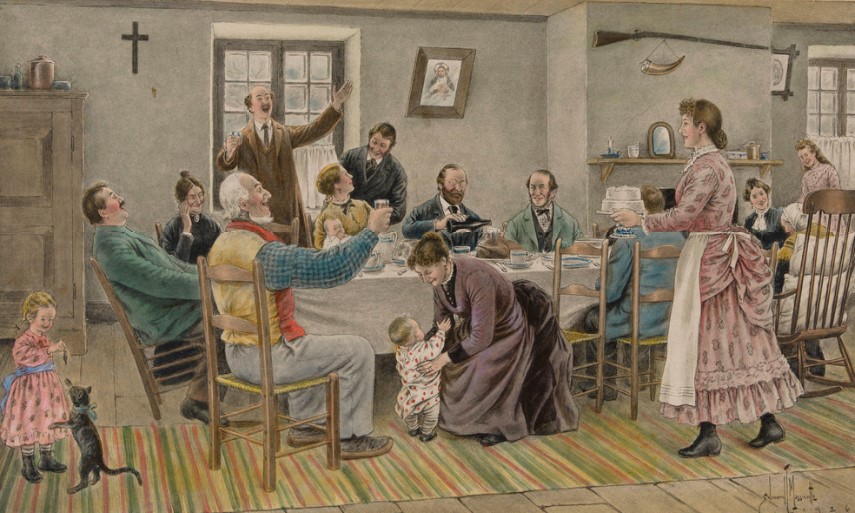Frequent blog readers need no introduction to Prosper Bender, whom I first introduced here. Though a homeopathic physician (yes, quite likely a contradiction in terms) by trade, Bender was most famous in his day for writing on the culture and political affairs of French Canadians.[1] As a contributor to prominent U.S. magazines, he helped nineteenth-century Americans better understand the peculiar people now settling among them. It is unclear how far he smoothed the edges of pervasive nativism; in any event, his own class biases sometimes did his subjects no great favour. His work at least stands as a direct witness to old customs inherited from the French regime.
Without further ado, then, here is Bender’s account of these customs as they concerned the winter holidays. The text is excerpted from an 1888 issue of the Magazine of American History.
Above all occasions of pleasure, for both young and old, are the great religious and national festivals—Christmas, New Year’s Day, Twelfth Day, and Saint John the Baptist’s Day—into the celebration and enjoyment of which the race enters with all its enthusiasm and fervor.
Christmas (le jour de Noël) is looked forward to with peculiar delight, and no pains spared to honor it. It is observed as a holiday apart from sacred character as a fête d’obligation. No matter how cold or stormy the night preceding, the custom is to close the houses and repair to the churches and take part in the imposing service, known as midnight mass (la messe de minuit). At this time the people are moved to great fervor in their anxiety to fittingly commemorate the birth of Christ. Among the scenes pertaining to this night were formerly the little gleams of light, to be seen at intervals for miles in the lonely country districts, or throughout towns and cities, at a time when gas-lighting was unknown, indicating the progress of pious worshipers through deep snowy roads towards that grand centre of desire, the church, at whose portals the lanterns were extinguished, to be relighted after mass. If the distance were very great, they traveled in carrioles or berlines, also bearing lanterns. […]

When the service is ended the worshipers return home to partake of a collation (réveillon), which is generally of bountiful character. The interest of the children is aroused long before the celebration, by the promise of attending the midnight mass as a reward for good behavior, and, as an after consideration of no small moment, a share in le réveillon.
Of late years this service [the midnight mass] is less in vogue than formerly, many parishes dispensing with it altogether, owing to the advantage taken of the absence of the farmers (habitans) by thieves, whose facilities for marauding are not a little augmented by the fact that in retired parishes the doors and windows are never fastened. And in the cities it also has been generally discontinued on account of the deeds of the riotous element on such occasions.
Many traditions and superstitions regarding supernatural events on the night preceding Christmas continue current from the foundation of the colony among the peasant class. […] Among the mysterious phenomena characterizing these sacred festivals in the popular imagination, the following are typical specimens:
On Christmas eve the entire animal creation is gifted with the faculty of speech, which is used in criticising the conduct of the human race towards it, giving praise or blame, as deserved; resolutions are made among them to perform grudgingly or inefficiently such work as is required by unreasonable masters, and, on the other hand, to give to those kind and gentle, fidelity and devotion. It is a no less common belief that the lucky person born on Christmas will never know want. In the remote districts young girls who are eager to learn their matrimonial prospects betake themselves on Christmas eve, at midnight, to the hen-coop, and strike the door three times, when, if the cock crow, it foretells their early marriage; but, if the response come from a disturbed hen, the bridal is to be indefinitely postponed. The pangs of disappointment or the ecstasies of delight which have followed this experiment would fill volumes. […]

The most notable holiday of the year is New Year’s day (le Jour de l’An), rendered specially attractive by tradition and the recollection of ancient customs, many of which are intertwined with religious and domestic observances. Free rein is given to the spirits of the people as the last night of the old year wears on, its successor being as joyously hailed as though it were the advent of a valued friend. Then comes one of the most characteristic and notable features of Canadian life. Those polite and cordial visits, beginning early in the morning of the first, and lasting some days of the new year. In the olden times, it was quite a picturesque sight to see, on a New Year’s morning, some of the citizens of Quebec paying their calls carrying their hats under their arms, indifferent to a temperature of 20° below zero, with the queues of their wigs blown to and fro by the wintry winds.
The formula of good wishes for the New Year is, usually: “On vous la souhaite bonne et heureuse, avec le Paradis à la fin de vos jours.” (We wish you a prosperous and a happy New Year, and may you see Heaven after your death.) Refreshments are liberally served, often quite beyond the peasant’s means. Such hospitality is not to be refused, and one must partake freely, in compliment to his successive hosts. The result is often a personal discomfort which furnishes frequent illustrations of that “killing with kindness,” that has passed into a proverb. […]
The visit of Santa Claus, with his bounties, for the youth of these Canadian homes, is an event of such interest, that around it are gathered hosts of traditions and delightful memories. His visit takes place New Year’s eve, and he is known as St. Nicholas. His good will is confidently predicted in the event of filial obedience, while, on the other hand, his ill-will is foretold to wayward children, implying the omission of all his favors. As an illustration of the latter, and the reasoning of the youthful mind, may be related that on one occasion a juvenile offender who had hung up his stocking in the hope that the saint would have forgotten his small sins, found, to his grief, in the morning, only a few sweatmeats [sic] and some potatoes. The poor little fellow was mournful enough for the forenoon, but at dinner he suddenly brightened up and remarked to his mother that perhaps it would be well for the family if he were wicked all the year round, for then St. Nicholas might leave potatoes enough for the whole year.

A festive ceremony is observed on Twelfth Night (le jour des Rois). In town and country it is usual for young and old to assemble in the evening and perform the operation of cutting the Twelfth cake (tirer le gâteau). The party gather about a large table and watch the cutting with great interest, the young people especially being eager to see who will be the fortunate recipient of the slice in which the pea or bean is imbedded. The lucky ones promptly announce their discovery; every sort of jest and compliment is exchanged. The possessor of the bean is crowned queen, and of the pea, king, and they are treated for the remainder of the evening with the homage due to such exalted personages.
[1] Why yes, this website has been profiting from Futurama-related web searches for over a year now.
As a final, personal note this year, I want to express my heartfelt thanks to those who have visited this blog. I owe a special debt to those of you who have “liked” and shared my research and writing. Thank you, also, to readers who have reach out, commented, or sent questions, all of which has made the blog all the more rewarding of an endeavor. Do not hesitate to send yet more questions—I am planning a special Q&A session with your feedback some time in the New Year.
At last, my friends, I wish you “a prosperous and a happy New Year.” May your stocking be forever full of potatoes (and gravy, and curd cheese).
Midnight Mass was packed at the French church I attended as a kid in the ’60’s and ’70’s. It was a high Mass with every altar boy in attendance and we sang as we proccessed up and down the aisles. Our organist, Mr. Hebert (who always used the French pronounciation) pulled out all the stops and hired a few horns and strings to add to the music. It was so over-the-top I think people came from the Irish parishes and the Protestant churches.
I remember extended family gatherings on New Years Day where my dad and his five siblings who lived in the area would rent out a church hall or restaurant banquet room so all the cousins (20 in all) could get together. Didn’t realize this was more a French-Canadian thing than a family thing.
I am 75. My most glorified memories of being a Canadian French Boy was the solemnity wrapped in joy. I loved the music, the high mass and the smell of wax candles.
We are well. the holiday food was fun. The aunts and uncles the friends that would visit. The house decorated in anticipation.
We would hear from my grandmothers sisters still in Canada. One north of the Laurentians mountains.
“On vous la souhaite bonne et heureuse, avec le Paradis à la fin de vos jours.” (We wish you a prosperous and a happy New Year, and may you see Heaven after your death.)
Thank you for sharing! De beaux souvenirs!
New Year’s Day was so special. Enjoyed New Year’s eve at my maternal grandparents in L’acadie, Quebec with aunts and uncles and 20 plus cousins. New Year’s evening was spent
at my paternal grandparents in Champlain, NY. with again another 40 cousins!! I am now 80 and these family gatherings are some of my fondest memories of my youth. The recollections of those years are making me smile.
That’s lovely! I know the feeling. Thank you for sharing!